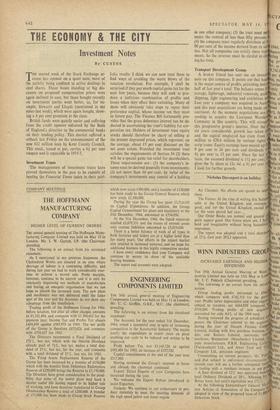THE ECONOMY & THE CITY
Investment Notes
By CUSTOS
THE second week of the Stock Exchange ac- count has opened on a quiet note, most of the activity being confined to active dealings in steel shares. Those issues standing at big dis- counts on proposed compensation prices were again inclined to ease, but those bought recently on investment merits went better, as, for ex- ample, Stewarts and Lloyds (mentioned in my notes last week), which were again bought, show- ing a 4 per cent premium at the close.
British funds were quietly easier and suffering from the credit squeeze enforced by the Bank of England's directive to the commercial banks on their lending policy. This market suffered a setback last Friday on the announcement of the new £12 million loan by Kent County Council. This stock, issued at par, carries a 61 per cent coupon and is repayable in 1975-7.
Investment Trusts
The managements of investment trusts have proved themselves in the past to be capable of beating the Financial Times index in their port-
folio results. I think we can now trust them to find ways of avoiding the worst blows of the taxation revolution. For example, I shall be surprised if they pay much capital gains tax for the next few years, because they will seek to pro- duce a judicious combination of profits and losses when they effect their switching. Many of them will obviously take steps to repay their preference capital, whose income tax they must in future pay. The Finance Bill fortunately pro- vides that the gross debenture interest can be de- ducted in ascertaining the trust's liability for cor- poration tax. Holders of investment trust equity stocks should therefore be chary of selling at the present depressed prices, which represent, on the average, about 15 per cent discount on the net asset values. Provided the investment trust satisfies the requirements of Section 34 (2) there will be a special gains tax relief for shareholders. These requirements are: (1) the company's in- come must be derived generally from investments; (2) not more than 10 per cent. by value of the company's investments may consist of a holding in one other company; (3) the trust must not 'under the control of less than fifty persons
(4) the company must regularly distribute at 90 per cent of the income derived from its se ties. Not all companies can satisfy these req ments. So the investor must be careful in ch ing his trust.
Transport Development Group
A broker friend has sent me an interes note on this company. It points out that hall is the major source of profits, providing just half of last year's total. The balance comes f storage, lighterage, industrial removals, pac shipping, light engineering and exhibition Last year a company was acquired in Aust and this year acquisitions are being made on continent. At the moment negotiations are ceeding to acquire the Liverpool Wareho Company in this country. This will stren this progressive group's interest. Over the six years considerable growth has taken P and the capital employed has risen from million to £28.6 million by various rights scrip issues. Equity earnings have moved up f 9 per cent to 26 per Cent and dividends f 41 per cent to 13 per cent. Since the last issue, the assumed dividend is 111- per cent. gives the 5s. share at 12s. 6d. a 41 per cent Y, 1 look for further growth.
Nicholas Davenport is on holiday.


































 Previous page
Previous page